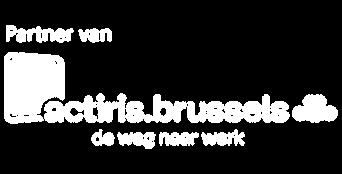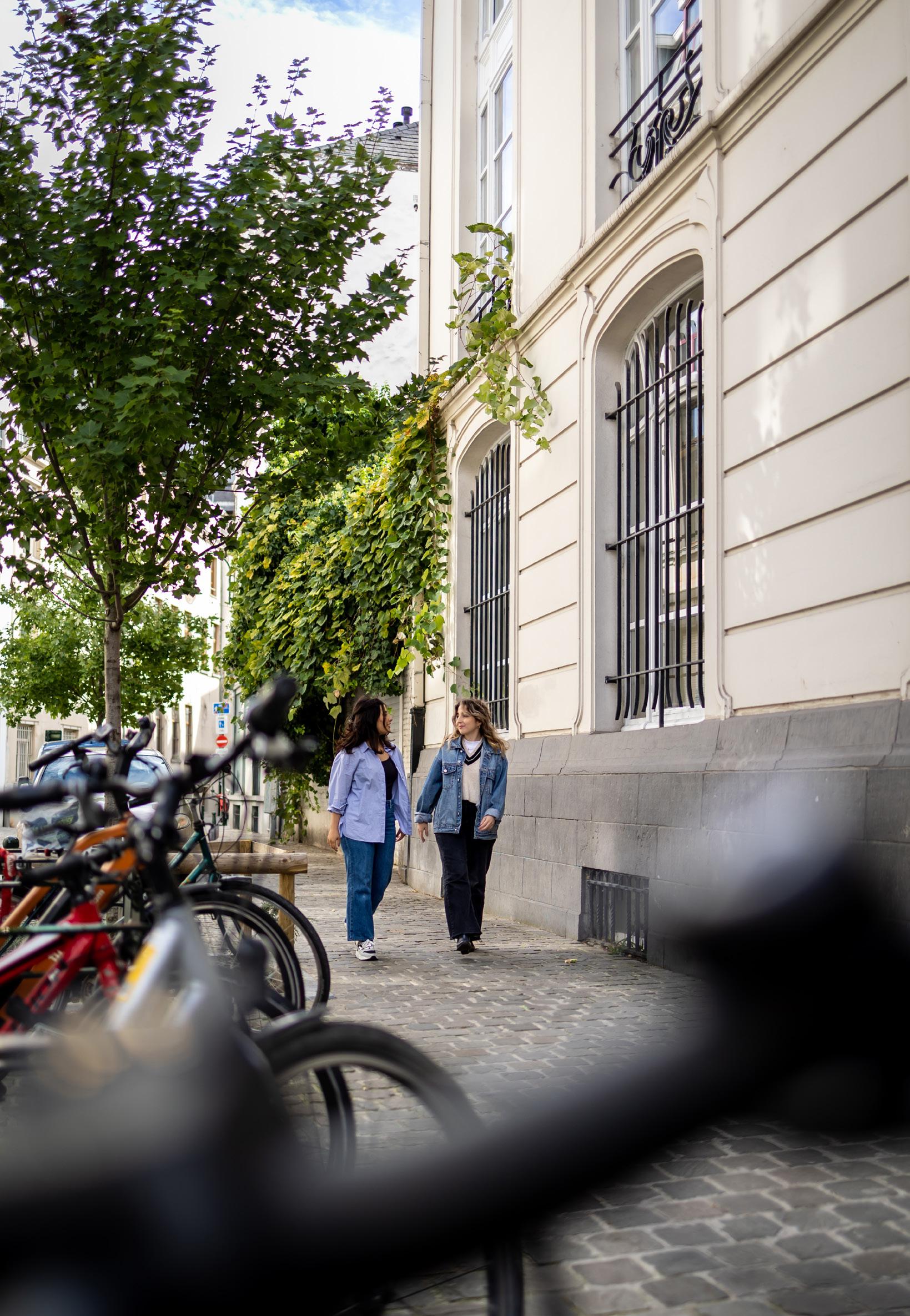UP & ABOVE
HIGHER EDUCATION IN BRUSSELS
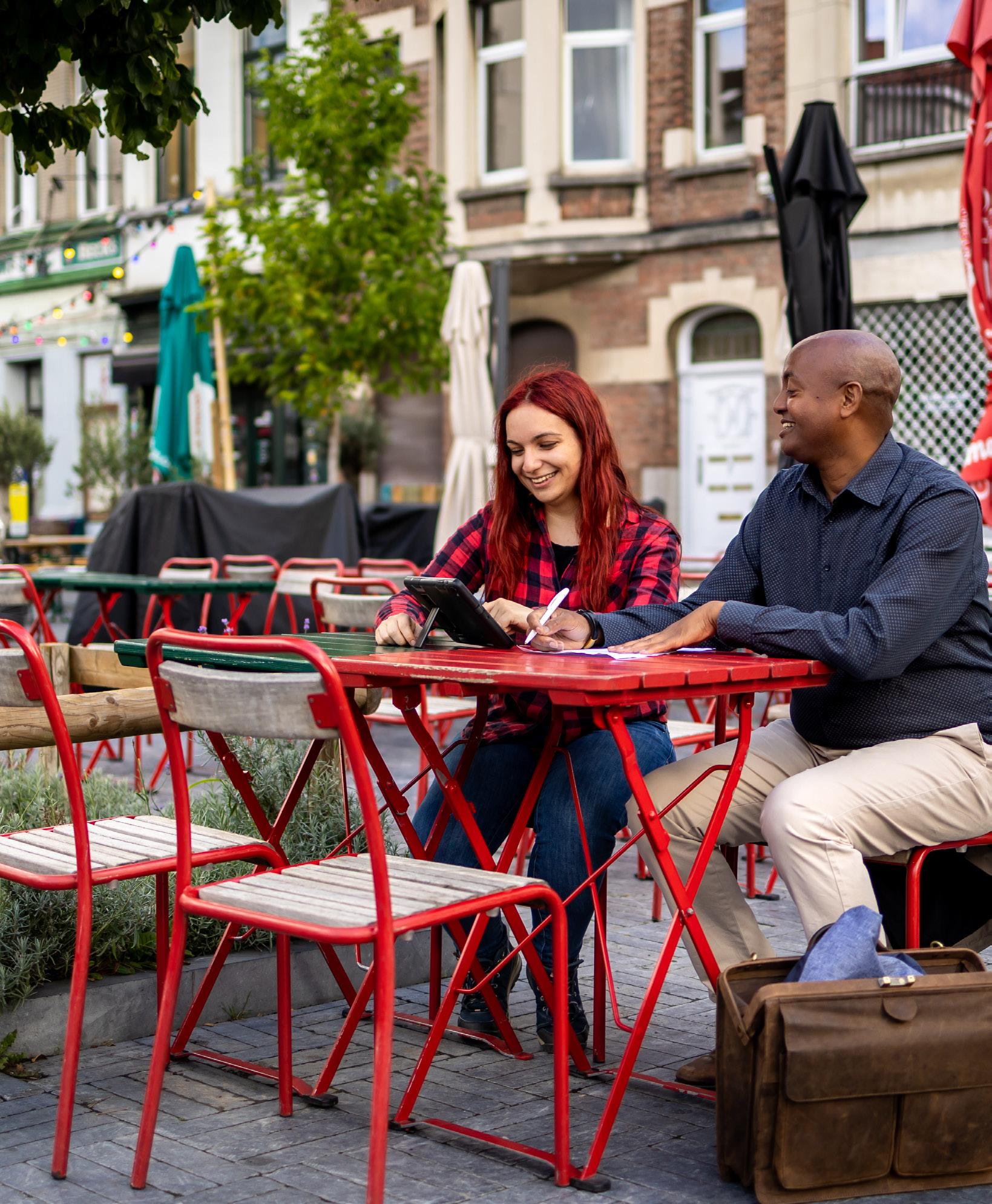




Looking for info on a specific topic? The table of contents on the right will take you straight to the right page.
The text next to the lamp icon gives you more explanation. For example, what a certain word means or where to go if you have any questions.
You will find more information about many topics online. Next to the globe icon you will find the right link.
Make it your own! Take notes, circle important information or fold over the corner of a useful page. That way you will quickly find what you are looking for.
Tip: use Google's translation plugin to translate any web page in this brochure into your language.
4 PREFACE
6 COURSES IN HIGHER EDUCATION
8 ROUTES TO A HIGHER EDUCATION DEGREE
10 INTERVIEW WITH AMEL AND BENJAMIN
14 CONDITIONS TO START / DIPLOMA / LANGUAGE LEVEL
16 LEARNING DUTCH
17 MANDATORY TEST OR EXAMS
18 READY FOR UNIVERSITY? DO THE TEST
19
21
22
34
Good news: you have taken the first step towards gaining a higher education degree. In this brochure you will find everything you need to know about studying in Brussels. What’s the next step? Just take it step by step:
1. Look for a course that suits you.
A graduate or bachelor’s degree? → PAGE 6
At a college or university? → PAGE 22
2. Check to see if there are conditions for enrolment. → PAGE 14
3. Not sure if you are ready for it? Do the test. → PAGE 18
4. Discover the student city of Brussels. → PAGE 24
5. What’s most important: have fun! → PAGE 26
What does your path look like? You decide. → PAGE 8 But no worries: we are here to help you. Leerwinkel Brussel and Brik are here to give you advice. Pass by and ask us your questions. You can find our contact details at the back of this brochure.
Ready? … Go!
This publication was made possible in collaboration with Leerwinkel Brussel and Brik. Read more on PAGE 34.

Do you have a secondary school diploma and would you like to continue to study? Then you can choose between three different kinds of courses, each with a different level:
1/ GRADUATE DEGREE
2/ PROFESSIONAL BACHELOR’S DEGREE
3/ ACADEMIC BACHELOR’S DEGREE
1/ GRADUATE DEGREE
college usually takes two years to complete you learn mostly through doing aimed towards bottleneck professions
Educational graduate degrees are short courses that prepare you for a profession. You get classes in small groups and you learn the profession through practical classes and workplace learning . You gain experience on the job.
A job where employers cannot find enough people to fill all of the vacancies. Are you following a course for a bottleneck profession? There is a big chance that you will find work quickly then.
You learn a profession by working in a company or organisation. You get guidance and learn from colleagues.
college usually takes 3 years to complete preparation for a job
After gaining a professional bachelor’s degree, you are ready to work. During the course, you get a mixture of theory and practice. The level of a professional bachelor’s degree is between a graduate degree and an academic bachelor’s degree.
Have you achieved a graduate degree and would you like to obtain a professional bachelor’s degree? This can be a fast-tracked. You already have a lot of knowledge from your graduate degree. For the lessons you have already done, you get an exemption. This is an approval from the college or university to miss certain subjects. Using exemptions, you may be able to finish your degree more quickly.
university takes 3 years preparation for a master’s degree
In an academic bachelor’s degree, you mostly learn a lot of theory about the topic you choose. After the bachelor’s degree, you are ready to follow a master’s degree course. There you can learn how to do research.
Would you like to follow a master’s degree after a professional bachelor’s degree? Then you need to go through a transition programme. This is a short course where you learn more theory than in your professional bachelor’s degree. Then you are ready for the master’s degree course.
3/The way to a higher education degree is not always a straight line. Which is not always necessary. Everyone follows their own path. Where are you heading? You get to decide.
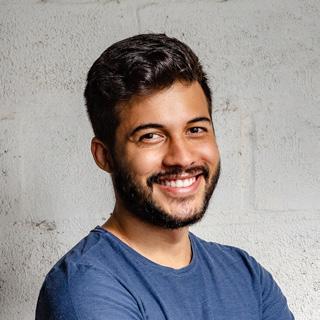
VOLUNTEERS IN A HOSPITAL TO PRACTISE SPEAKING DUTCH
SECONDARY SCHOOL IN BOLIVIA
LEARNS DUTCH IN A CVO
→ PAGE 15
HAS HIS BOLIVIAN DIPLOMA RECOGNISED
GRADUATE DEGREE IN NURSING
WORKS AS A NURSE
SECONDARY SCHOOL DIPLOMA IN ELECTRICITY
PROFESSIONAL BACHELOR’S DEGREE IN APPLIED COMPUTER SCIENCES
WORKS AS A SOFTWARE DEVELOPER
COMES TO BELGIUM
PART-TIME SHORTENED COURSE FOR THE
PROFESSIONAL BACHELOR’S DEGREE IN NURSING
→ PAGE 7
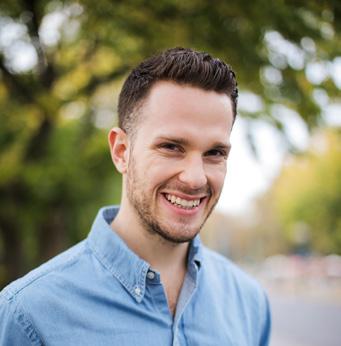
TAKES PART IN THE CALIBRATION TEST
→ PAGE 18
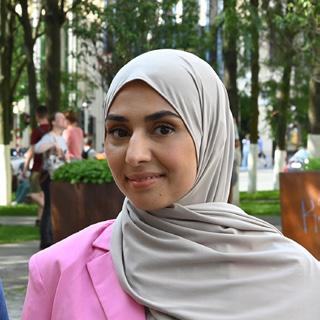
SECONDARY SCHOOL
DIPLOMA FROM ABROAD IS NOT RECOGNISED IN BELGIUM
A FIXED CONTRACT AT THE INTERNSHIP PLACEMENT
AND YOU?
DIPLOMA
LEVEL OF DUTCH → PAGE 15
DREAM JOB
HIGHER EDUCATION → PAGE 6
TOWARDS YOUR DREAM JOB
PASSES THE ENTRANCE EXAMS
→ PAGE 17
WHERE YOU ARE GOING TO STUDY
→ PAGE 22
WORKS FOR THE FLEMISH GOVERNMENT
GRADUATE DEGREE IN SOCIAL WORK
A REALLY ENJOYABLE INTERNSHIP
Read more about Amel’s path on PAGE 10.
“A GRADUATE DEGREE WAS THE RIGHT CHOICE AFTER HAVING WORKED A COUPLE OF YEARS.”
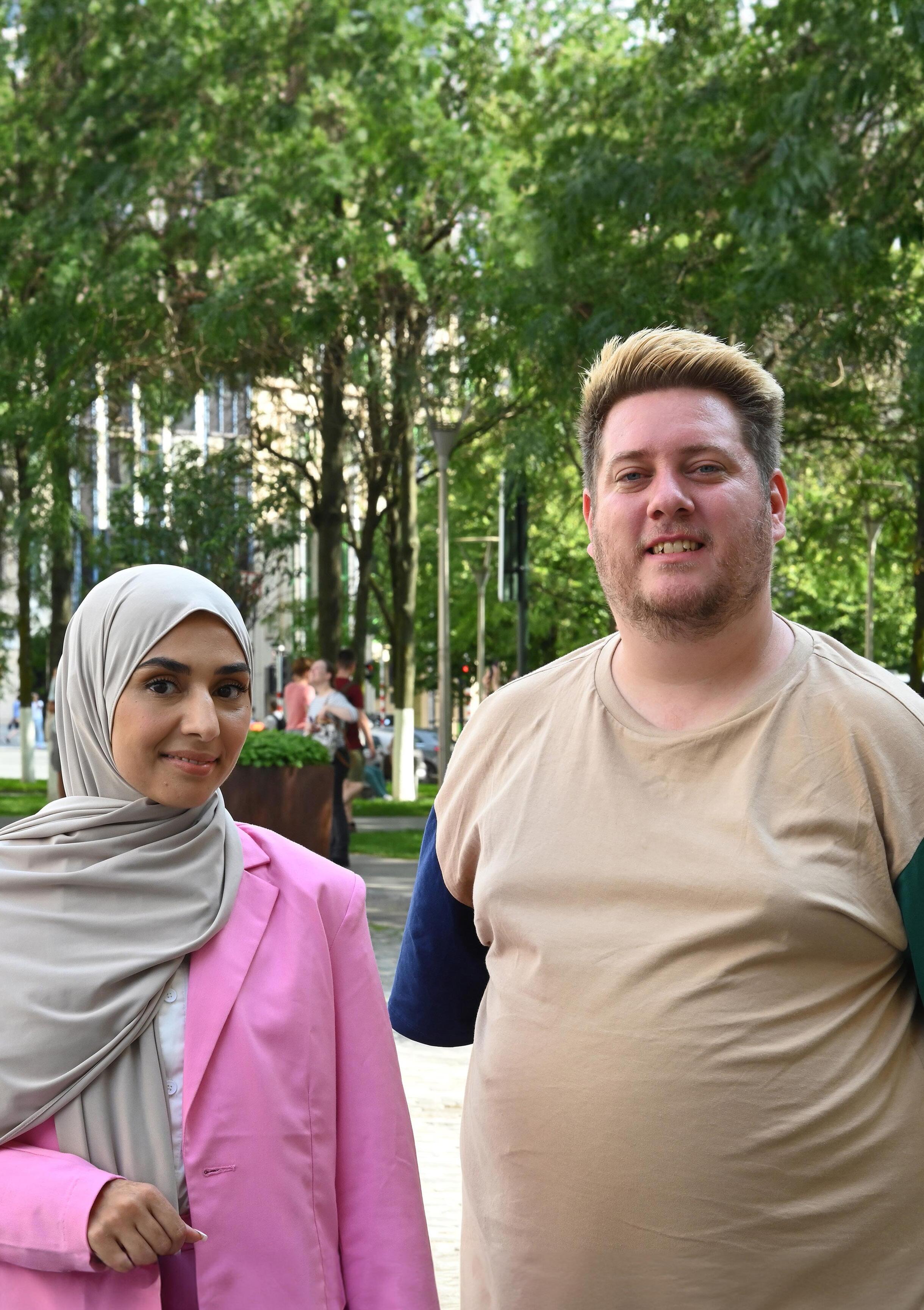
AMEL
“BY GETTING A HIGHER EDUCATION DIPLOMA, I CAN EARN MORE LATER.”
Starting to study again later in life: it is a decision that requires a bit of courage. Amel Gaidi and Benjamin Capoen both took a chance and made the leap. They chose to study again after a couple of years working. The Graduate Degree in Social Work at Odisee was a springboard for them towards better work. They talked about their study choices on a sunny day in Brussels.
Amel had already been working as a civil servant for a couple of years. “I had a good job, but it didn’t make me happy,” she said. “I spent a long time thinking about whether I should continue
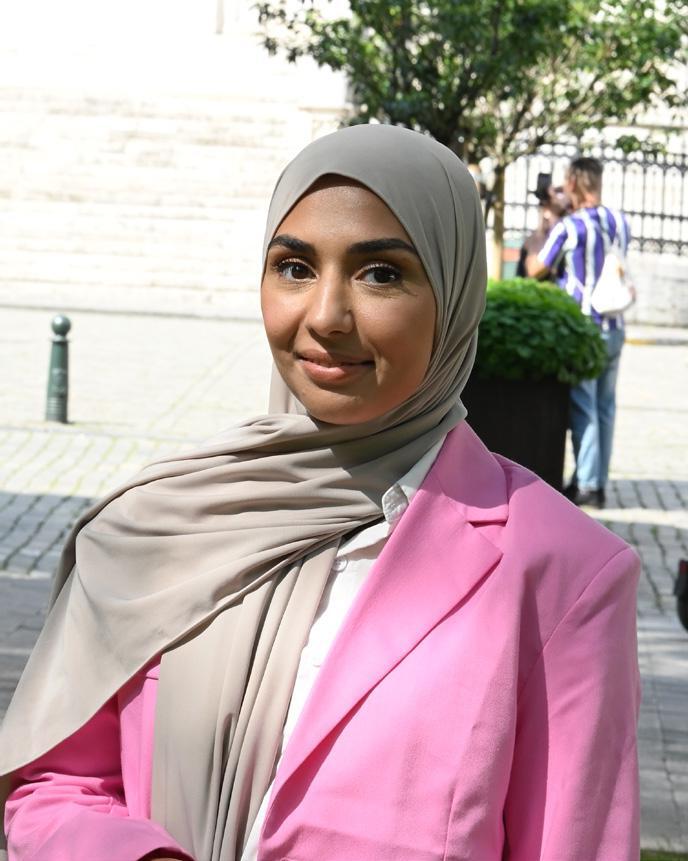
studying. Which was not easy: I had to take my family into account. And my secondary school diploma was not recognised in Belgium. So I didn’t meet the criteria to start a course.”
What was Amel’s solution? A graduate degree course. “I was allowed to start the Social Work Course after passing an entrance exam . This motivated me to keep going. The course consisted in two days at school and three days at an internship. Which is really intensive. But as soon as I started the internship, I knew for sure: this was the right decision for me.”
“I completed my studies in 2022″, says Amel. “That was a big milestone. Then I applied for a job in Leerwinkel Brussel, where I also did my internship. Now my job is helping other people with their study questions. I love doing this: my own story is an example for other people. Yes, it was very hard to give up my steady job to go and study. But it was an investment in myself. That is always worth it.”
“INVESTING IN YOURSELF IS ALWAYS WORTH IT.”
Benjamin worked for a couple of years in childcare, but he couldn’t see a future for himself in the job. He has just completed his first year of the Social Work Course. “I’m already half way there!” he laughs. “The first year flew by. It was a conscious choice to follow the course over two years. A longer course? That wasn’t an option financially. I am currently living off my savings and a student job. But by getting a higher education diploma, I can earn more later. That was the deciding factor in the end.”
“MAYBE I’LL WANT TO CONTINUE ONTO A BACHELOR’S DEGREE AFTER COMPLETING MY GRADUATE DEGREE.”
great deal of satisfaction and motivation. Who knows? Maybe I’ll want to continue onto a bachelor’s degree after completing my graduate degree. I have got the hang of this studying!”
“It’s definitely not always easy,” says Benjamin. “But I know that I will end up better off when I have my diploma in my pocket.” Amel nods: “You’re not
“The graduate degree programme is the perfect mix of practical and theory for me,” explains Benjamin. “After secondary school I started a bachelor’s degree, but I couldn’t study well. I manage a lot better now because I also learn a lot on the job. My internship is going well and I don’t have any retake exams. This gives me a
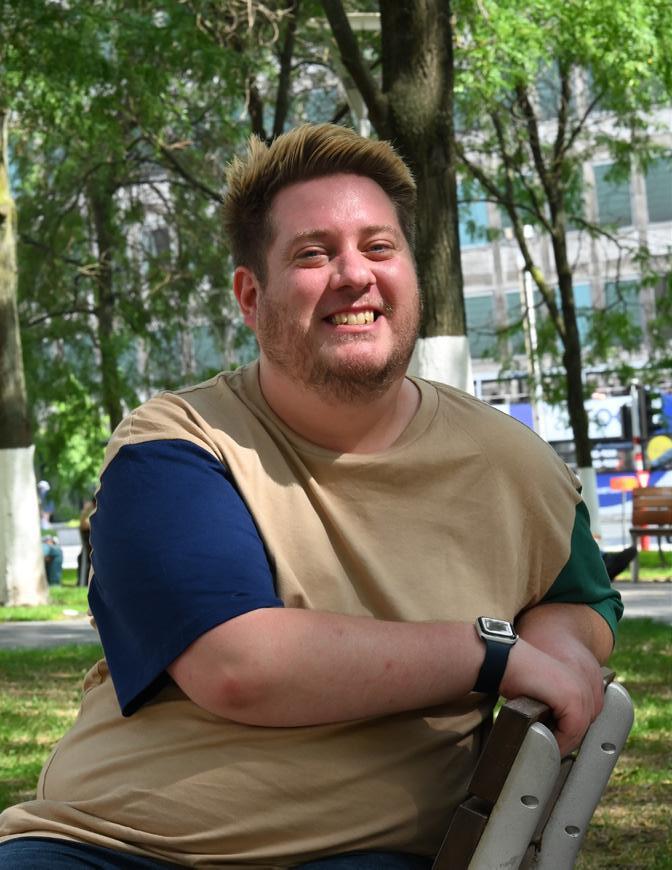
allowed to give up. When I found it difficult, I could always talk to my course supervisor or I could go to the student support services . They are there to help you. You’re not alone.”
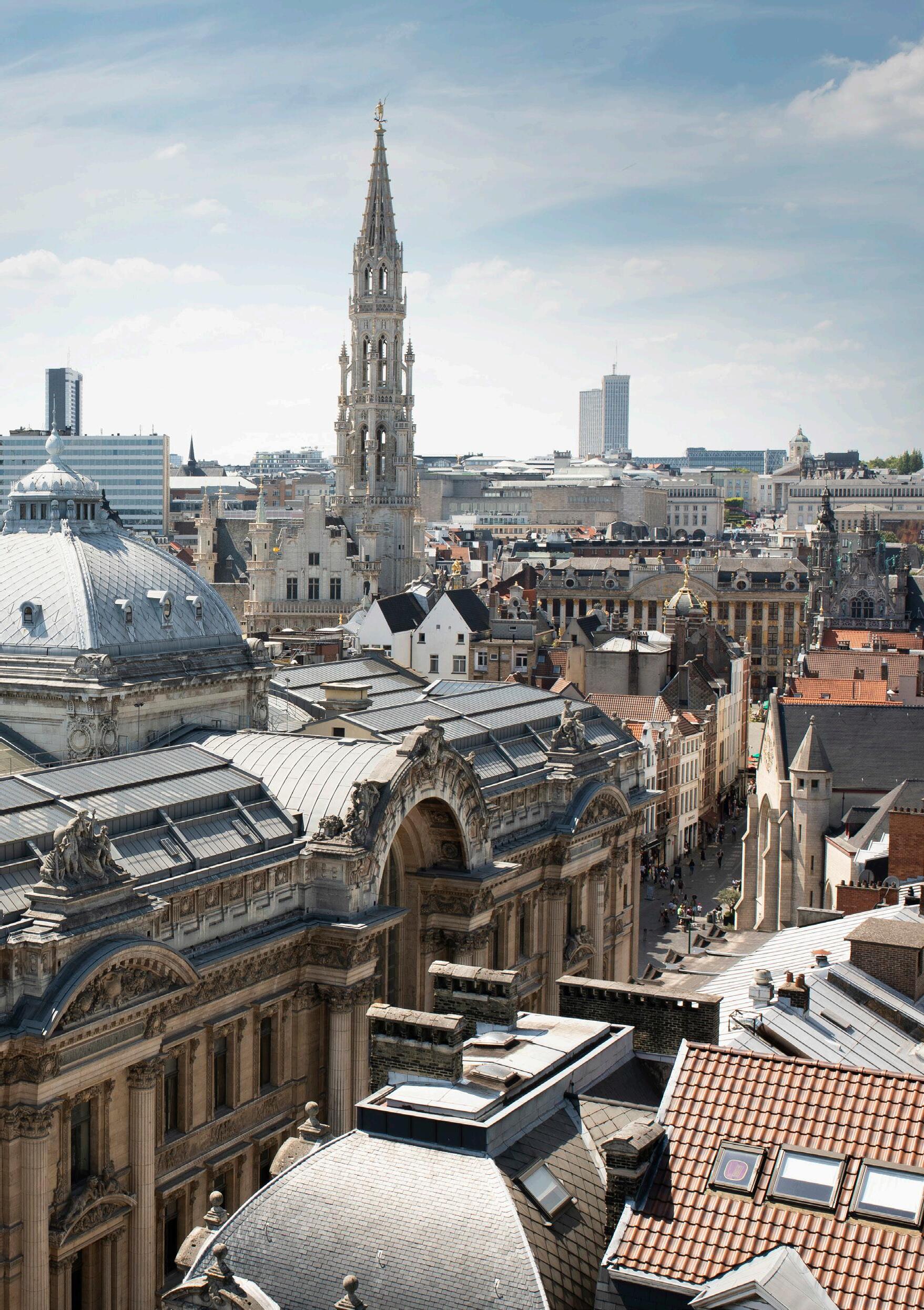
You can start the graduate degree course without a secondary school diploma. You first need to pass a test of your knowledge and skills. Read more on PAGE 17.
All colleges and universities offer support for their students. Read more on PAGE 19.
GRADUATE DEGREE
To get started in higher education, you usually need a secondary school diploma. You also need to know enough Dutch. But what if that is not the case? Do not worry: you will get there. See what applies to you below.
LANGUAGE LEVEL
B1 (2.4) with a CVO certificate or ITNA/CNaVT
DIPLOMA Secondary school or a certificate from the sixth year of secondary school
WHAT IF YOU DO NOT HAVE A DIPLOMA?
AND A FOREIGN DIPLOMA?
You are at least 18 years old on the 31st of December of the year when you start the course +
Entrance Test
PROFESSIONAL BACHELOR’S DEGREE
B2 (3.2) with a CVO certificate or ITNA/CNaVT
Secondary school
ACADEMIC BACHELOR’S DEGREE
B2 (3.2) with ITNA/CNaVT
You are at least 21 years old on the 31st of December of the year when you start the course +
Process for special permission for the college or university: test and discussion
Go to the college or university you wish to enrol to and bring your foreign diploma with you. The college or university decides whether your diploma is sufficient to start the course.
You can also start in higher education without a diploma. Then you need to take part in the entrance test or the process for special permission. Read more on PAGE 17. You also need to be old enough to start.
READ MORE
→ onderwijs.vlaanderen.be/toelatingsvoorwaarden-hoger-onderwijs
→ www.toelatingsonderzoek.be
You can prove your language level by:
Presenting a certificate from a Dutch-language course at a CVO (Centrum voor Volwassenenonderwijs, Centre for Adult Education), or
Taking a language test : the Interuniversity Test of Dutch for Speakers of Other Languages (ITNA , Interuniversitaire Taaltest Nederlands voor Anderstaligen) or the test for the Certificate for Dutch as a Foreign Language (CNaVT, Certificaat Nederlands als Vreemde Taal ). You complete a test and get a certificate if you pass.
Did you attend a Dutch-speaking secondary school for at least 1 year? Then you do not need a certificate for your language level.
LEVEL B1
You need a language level of B1 or B2 to get started on a course in higher education. But what does that actually mean?
means that you can read the newspaper in Dutch and you can carry out a conversation.
You need a level B1 to start a graduate degree course.
LEVEL B2
means that you can follow the news on television. You can write a text yourself about your opinion on a topic.
You need a level B2 to start a bachelor’s degree.
It depends on how many classes you follow. It usually takes a couple of years to learn enough Dutch to be able to follow a course in higher education. You start with a level A1 at a Centre for Adult Basic Education (Ligo). The Centre for Adult Education (Centrum voor Volwassenenonderwijs, CVO) offers a faster course. It then takes 1.5 years to achieve level B1. And at the University Language Centre it goes even faster. Read more:
www.integratie-inburgering.be/erk-berg
How do you choose the right Dutch language course for your situation? Ask the Dutch Language House (Huis van het Nederlands) for advice.
www.huisnederlandsbrussel.be
Would you like to practise Dutch? This is possible in a lot of places in Brussels. Go to PAGE 28 for a list.
Ready to sign up for a course in college or university? In some cases, you need to complete a test or exam first.
onderwijs.vlaanderen.be/toelatingsvoorwaarden-hoger-onderwijs
You would like to start a graduate degree, but you do not have a secondary school diploma? The college or university decides whether you are ready to start the course. This is called an entrance test . You can take part once a year.
If you pass, you get an entrance certificate for the graduate degree course. This certificate is valid for all colleges in Flanders. Take a look at the website for practice examples of the test.
www.toelatingsonderzoek.be
For certain professional or academic bachelor degrees, you first need to pass an entrance exam. Then you can register for the course. For example
Artistic entrance exam for an art course
Entrance exam for a course to become a doctor, dentist or vet
You get more information at the college or university.

To start an academic bachelor’s degree, you already need to know a lot. With a calibration test , you find out if you know enough about maths and science. For some courses, a calibration test is even mandatory.
The calibration test checks your knowledge and compares it to the courses’ entry level. That is why the calibration tests are a bit different, it depends on which course you would like to follow. For example, the calibration test for pharmaceutical science is different to that of computer science.
For some scientific courses, a calibration test is mandatory. You can complete any calibration test you want. After the test, you get a certificate of participation. You bring this certificate with you when you enrol for the course. You need to complete the test in the same year as your enrolment.
The calibration tests are not binding. You can still enrol for the course, even if you did not pass. You will need to follow a remedial course, though. These are a couple of extra subjects you will have to take before or during your first academic year. All universities offer these kinds of remedial programmes.
www.ijkingstoets.be
All colleges and universities have Student Support Services or ‘stuvo’. This is a service where you can request social, medical or psychological help. You can find the support services here:
Building D entrance hall
Pleinlaan 2
1050 Elsene
+32 2 629 20 10 info@vub.be
T’Serclaes building
Warmoesberg 26
1000 Brussels
+32 2 210 13 19 brussel@stuvoplus.be
→ odisee.be/stuvo
Students at KU LeuvenBrussel, Campus Brussel can contact STUVO (Odisee)
Students at KU LeuvenBrussel, Campus Sint-Lucas can contact Stuvo LUCA Brussels
Lefrancqstraat 9
1030 Schaarbeek
+32 2 250 11 13 stuvo.brussel@luca-arts.be
→ luca-arts.be/stuvo-luca-brussel
UNIVERSITY - STUVO EHB
Slotstraat 28
1000 Brussels
+32 2 559 15 77 stuvo@ehb.be
→ ehb.be/stuvo
Look at PAGES 24 AND 25
Every year, Brik reserves nice spots to study together. You look for a study space online and you choose where you want to go and study that day. Read more at brik.be/study-spaces.
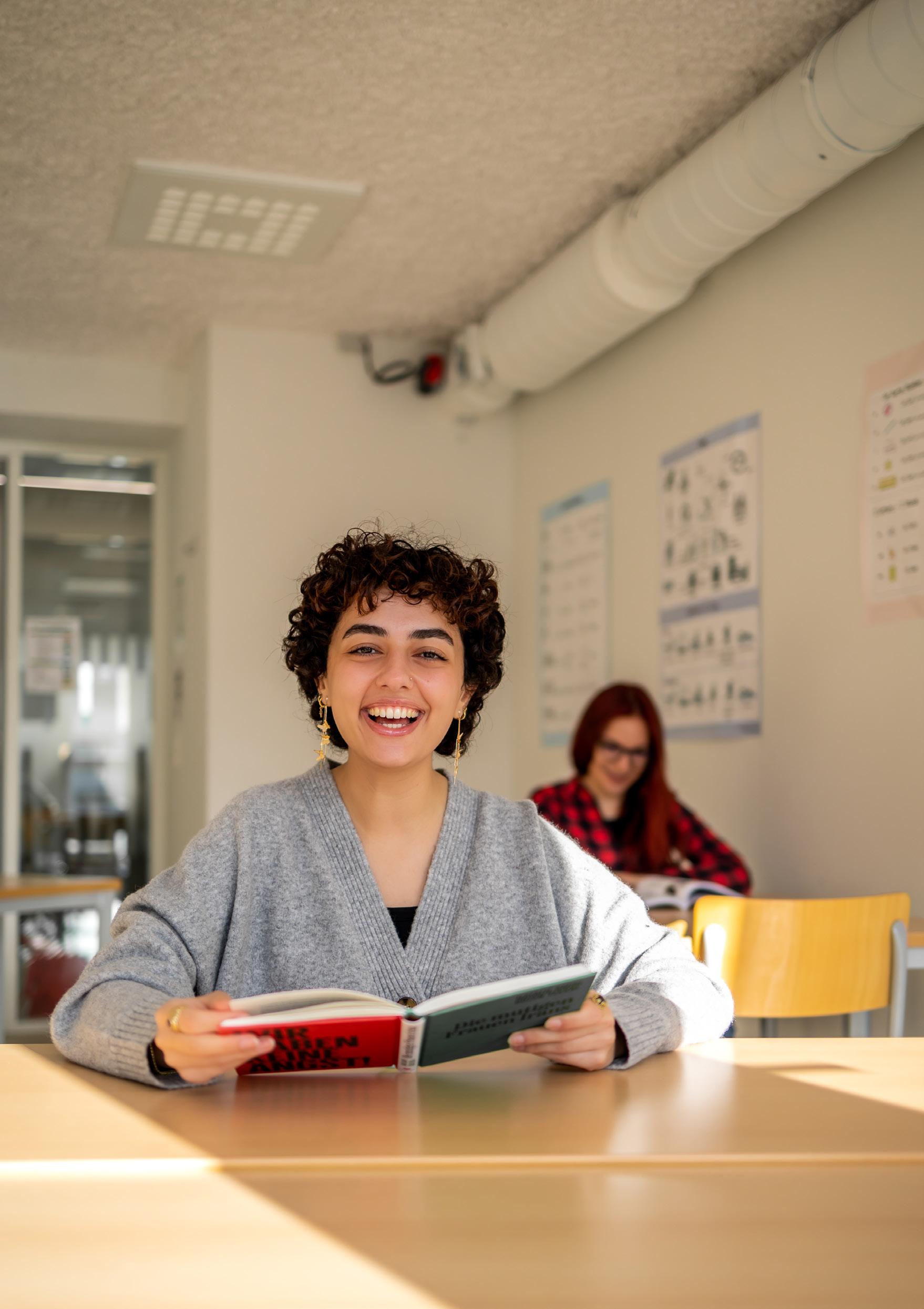
"Eat healthy! It sounds cliché, but it really works. I drink a lot of water and eat healthy snacks while I am studying. This gives me a lot of energy."
"My friends and I make a study revision plan together. We take a break together after a good study session. It helps me to take my mind off things."
LARAIs it a struggle for you to pay for your studies? Talk about it with the stuvo in your college or university. The government has programmes to help students financially with a scholarship. It is best if you apply at the start of the academic year.
www.centenvoorstudenten.be
"I ask older students what questions they got in last year’s exam. Then I know a bit better what I can expect."
"I turn my phone onto aeroplane mode and turn off all notifications on my laptop. That way I am not distracted. During my break, I take a look at what I have missed."
"The Study Spaces are great places to concentrate. I prefer to study together rather than alone. Don’t forget to reserve a spot, otherwise you will waste time."
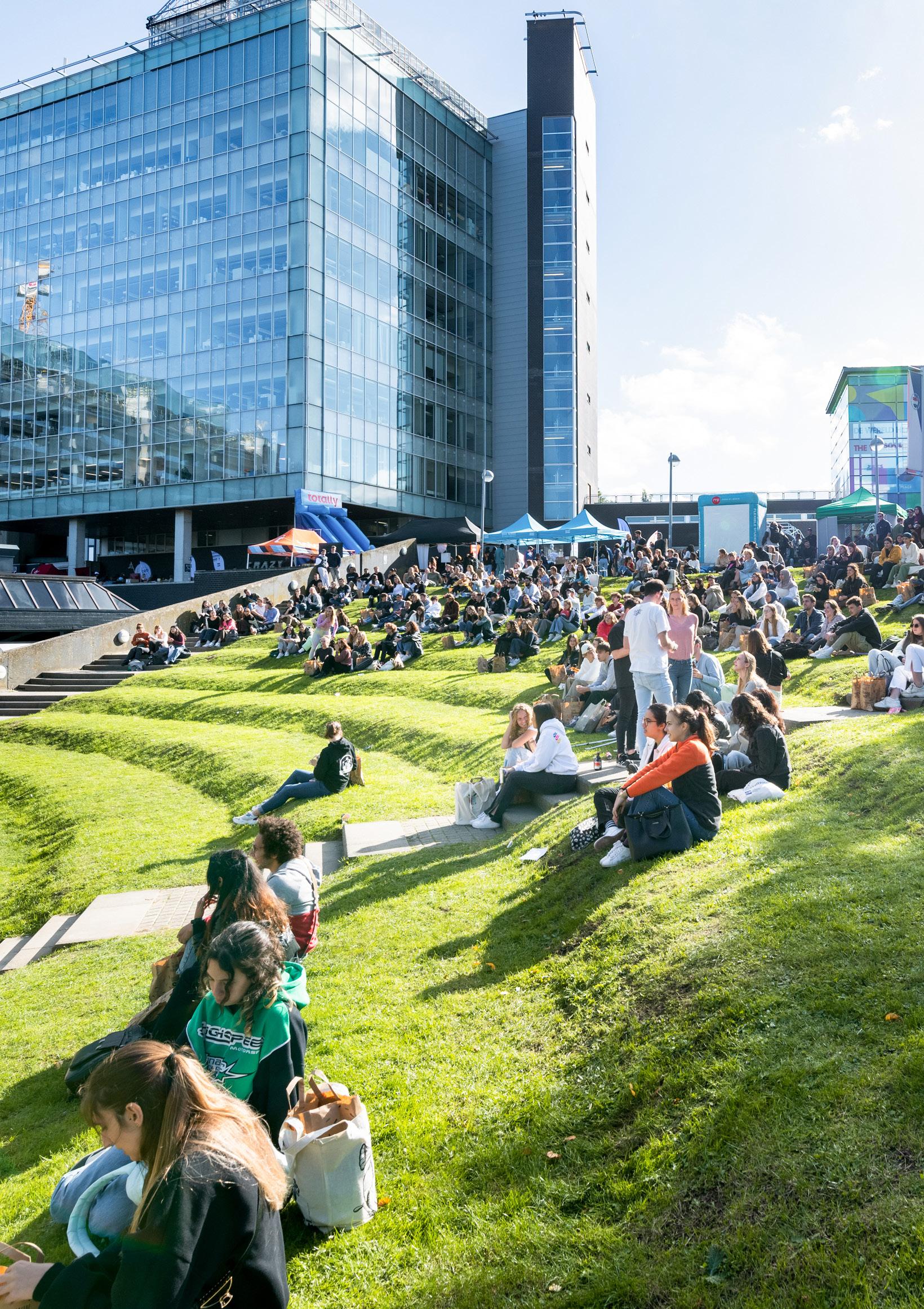
VRIJE UNIVERSITEIT BRUSSEL
www.vub.be
A VUB Main Campus and Student Info
Hub
Pleinlaan 2, 1050 Elsene
B VUB Health Campus
Laarbeeklaan 103, 1090 Jette
ERASMUS BRUSSELS UNIVERSITY OF APPLIED SCIENCES AND ARTS
www.erasmushogeschool.be
C Campus Kaai
Nijverheidskaai 170, 1070 Anderlecht
D Campus Bloemenhof
Zespenningenstraat 70, 1000 Brussels
E Campus Kanal and Stuvo
Slotstraat 28, 1000 Brussels
F Campus Jette
Laarbeeklaan 121, 1090 Jette
G RITCS – Campus Dansaert
Antoine Dansaertstraat 70, 1000 Brussels
H RITCS – Campus Bottelarij
Delaunoystraat 58, 1080 Sint-JansMolenbeek
I Koninklijk Conservatorium Brussel
Regentsschapstraat 30, 1000 Brussels
J Campus COOVI
Emile Grysonlaan 1, 1070 Anderlecht
ODISEE
www.odisee.be
K Campus Brussel en STUVO
Warmoesberg 26, 1000 Brussels
L Campus Brussel – Terranova Blekerijstraat 23-29 bus 1, 1000 Brussels
M Campus Dilbeek Stationstraat 301, 1700 Dilbeek
N Campus Schaarbeek
Huart Harmoirlaan 136, 1030
Schaarbeek
LUCA - SCHOOL OF ARTS
www.luca-arts.be
O Campus Sint-Lukas Brussel
Paleizenstraat 70, 1030 Schaarbeek
Stuvo LUCA Brussel
Lefrancqstraat 9, 1030 Schaarbeek
P Campus Narafi
Victor Rousseaulaan 75, 1190 Vorst
KU LEUVEN - CAMPUSSEN BRUSSEL
www.kuleuven.be/campus/campusbrussel
Q Brussel, Campus Brussel
Warmoesberg 26, 1000 Brussels
R Brussel, Campus Sint-Lucas
Paleizenstraat 65-67, 1030 Brussels
A VUB Main Campus
B VUB Health Campus
C Campus Kaai
D Campus Bloemenhof
E Campus Kanal
F Campus Jette
G RITCS – Campus Dansaert
H RITCS – Campus Bottelarij
I Koninklijk Conservatorium Brussel
J Campus COOVI
K Campus Brussel
L Campus Brussel – Terranova
M Campus Dilbeek
N Campus Schaarbeek
O Campus Sint-Lukas Brussel
P Campus Narafi


Q Brussel, Campus Brussel
R Brussel, Campus Sint-Lucas





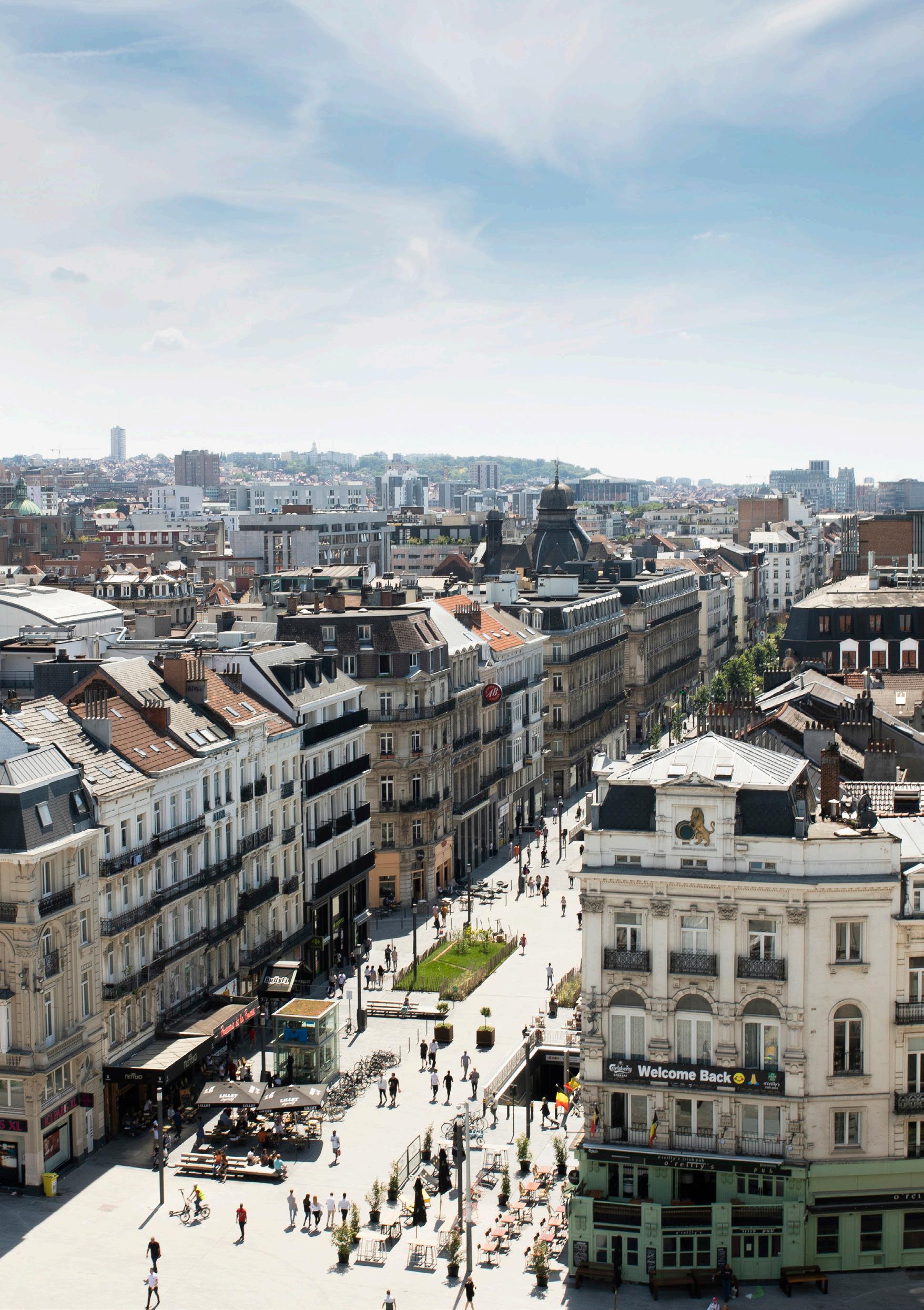

There is always something to do in Brussels. Especially for students. Are you looking for a cosy place to drink coffee with friends? Would you like to know where you can practise speaking Dutch? Or do you want to get to know other students? You will find out so much more in the next few pages. And that is only the start of what Brussels has to offer!
/ BUCKETLIST BXL
1 Go to a Union Sint-Gillis of RWD Molenbeek football match.
2 Visit a museum on Wednesday for 2 euros.
3 Go swimming in the open-air swimming pool, Flow, in Anderlecht.
4 Stroke a goat in the farm in the Maximiliaan Park.
5 Catch tram 44 for the most beautiful tram route in Belgium, right through the forest.
6 Find something retro or artistic at the Flea Market at Vossenplein.
Are you looking for something to do in Brussels? Visit a museum or an exhibition. There are dozens, big and small, spread out across the city.
brusselsmuseums.be
Theatre, concerts, parties, events, … There is always something happening in Brussels. You can find an overview on the visit.brussels website. The site also offers tickets with a discount if you go to a show on the same day you book your tickets.
visit.brussels
Brussels has 22 community centres . They organise interesting activities, workshops, courses and shows. It is also a great place to get to know other people in Brussels.
www.n22.brussels
The Dutch Language House (Huis van het Nederlands) brings people together to learn Dutch. Because it always works better together than alone.
www.nederlandsoefeneninbrussel.be
The free Brulingua app helps you learn Flemish. Or French, English or German. Because Brussels loves all languages.
www.brulingua.be
Would you like to learn a new language? It is easier with a friend. Find a match with Patati. You meet people who want to learn your mother tongue and who can help you with Dutch.
www.patati.be
Muntpunt is the biggest Dutch-language library in Brussels. You can borrow books and study in peace. Muntpunt also has an overview of all activities happening in the city. You’ll never be bored!
www.muntpunt.be
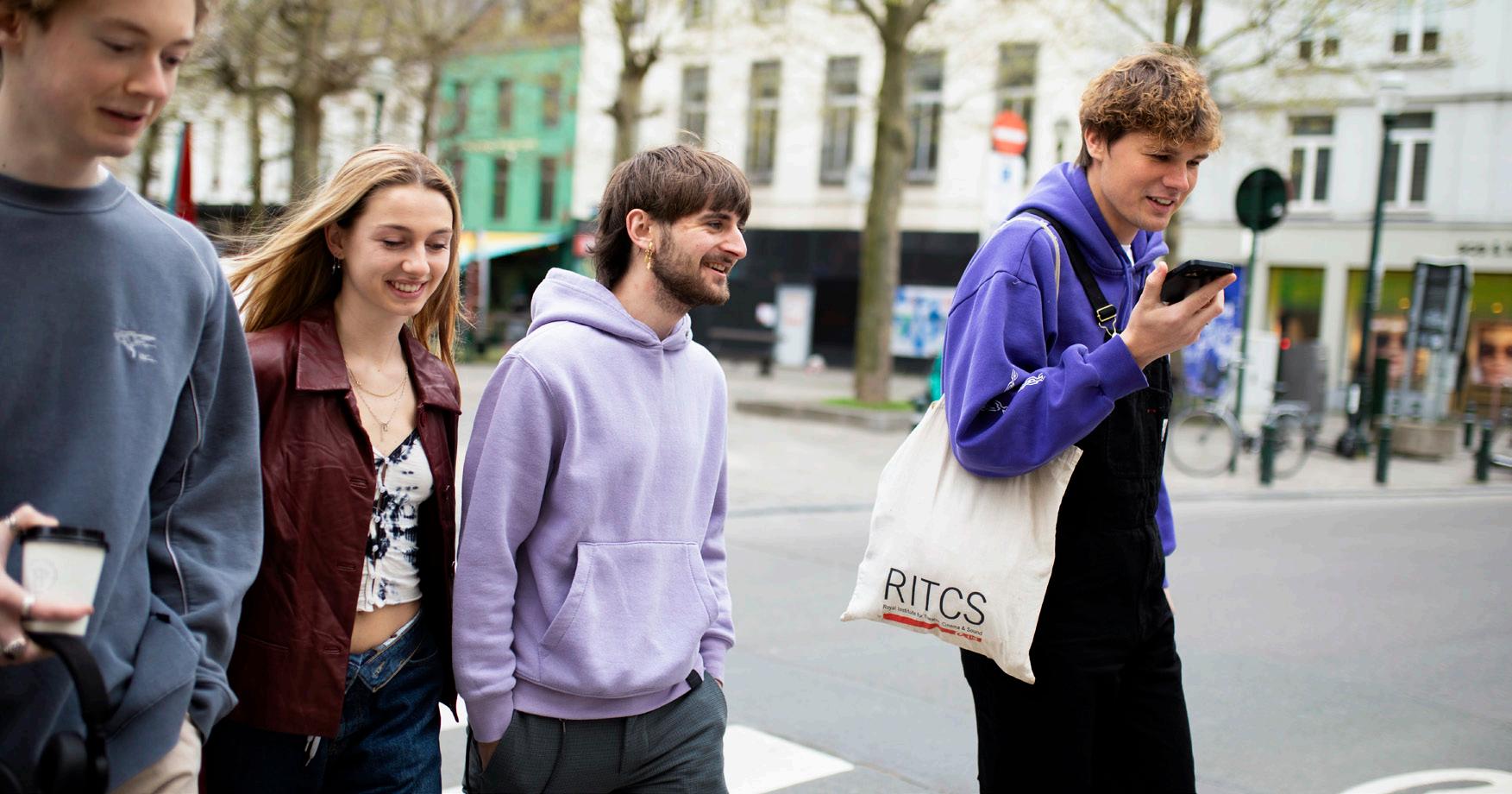
Archipel - pub with live music
Barbeton - open all day for a coffee or a cocktail
Jardin Hospice - open-air bar in an old retirement home
Le Coq - a classic for real people of Brussels
Les Brasseurs - a nice café under the studio of the rapper Zwangere Guy
Bizon - a cosy café with regular shows
MOLENBEEK
Replica - coffee bar
Brasserie des Alliés - tasty and affordable food
Bar du Matin - hip art-deco bar near the park
Café la Pompe - café in an old petrol station
L’Estaminet - a quiet café with a garden and fountain
Cache-pot - coffee and plant shop
Brussel Brost is a free festival for students, organised by Brik. It is the best place to get the academic year off to a good start.
The café festival Stoemp! is the perfect opportunity to discover the best cafés in Brussels. During the Museum Night Fever, the museums in Brussels are open at night. And Nuits Sonores is a culture programme filled with concerts, readings and debates.
Saint-Vé is a parade organised for and by students through the centre of the city.
The Christmas Market of Brussels is internationally renowned. Make sure you have a go on the Ferris wheel. You see the city from a whole new perspective. Do not forget your exams: you can study together in the Study Spaces in December and January. Read more on page 20.
During the open lesson days, you can follow a class at the university or college. This can be really useful when you need to make a study choice.
All Dutch-speaking universities and colleges organise info days in spring. You find out all there is to know about the courses that interest you.
The Botanical Gardens organise Les Nuits Botanique, a festival with dozens of concerts.
In springtime, Brussels really comes to life. Everyone is welcome at the Iris Festival , the Pride Parade, the Brussels 20km race ( 20km door Brussel ) and the Kunstenfestivaldesarts .
Take a break whilst studying with the free Plazey festival in Elisabeth Park. Or go to a concert or DJ set during Out Loud in the Beursschouwburg. You can also get to know the city on wheels during the Roller Bike Parade or on the bike during the BXL Tour.
The Zuidfoor is a fair along the Zuidlaan which happens from mid-July to midAugust. Atmosphere, attractions and summer weather: what’s not to like?
Boterhammen in het park (Sandwiches in the Park) and the Feeërieën are two free festivals in the Warande Park. You can end the summer under the trees with great music.
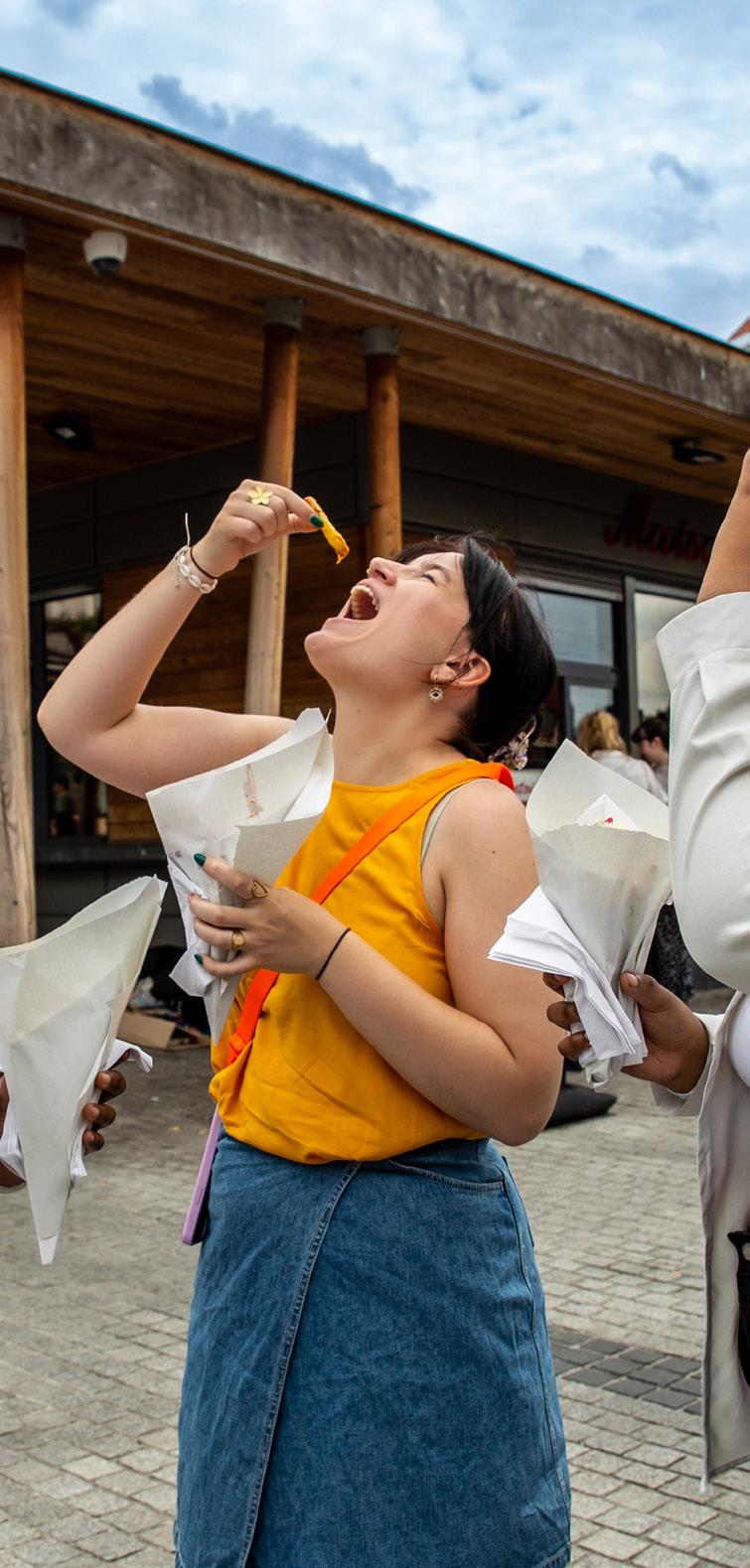
The Beroepenpunt gives career advice. You can find various partners that give you information about choosing a topic, learning, working, entrepreneuring and moving.
www.beroepenpunt.brussels
Astro Tower, Sterrenkundelaan 14, 1210 Sint-Joost-ten-Node
@citedesmetiers.beroepenpunt.brussels
One of Beroepenpunt ’s partners is Leerwinkel Brussel. You can contact them with any of your questions about (continuing) studies in Brussels.
Would you like to talk to a learning career coach? Pop into the Beroepenpunt on Wednesday (morning or afternoon) or Thursday (afternoon or evening until 7 PM). Can't make it on those days? Then drop in at Leerwinkel Brussel itself.
www.leerwinkel.brussels
Rouppeplein 16, 1000 Brussels
@leerwinkelbrussel
Brik is the place to be for all of your questions about studying in Brussels. Are you looking for a studio in Brussels? Do you want to know how you can catch the tram, metro and bus for a cheap price? Or, are you curious about what there is to do in the city? Brik is happy to help you.
www.brik.be
Zavelput 20, 1000 Brussel
@brikstudentinbrussel
www.actiris.brussels
www.vdab.be
www.werkwinkel.brussels
www.schakelsnaarwerk.be
www.cosearching.be
www.jumpnaarwerk.brussels
www.duaalleren.brussels
www.watwat.be
www.jonginbrussel.be
www.vub.be
www.kuleuven.be/campussen/campusbrussel
www.odisee.be
www.erasmushogeschool.be
www.luca-arts.be
www.huisnederlandsbrussel.be
www.bon.be
www.n22.brussels
www.nederlandsoefeneninbrussel.be
www.onderwijskiezer.be
www.onderwijs.vlaanderen.be
www.ahovoks.be
www.naricvlaanderen.be
www.onderwijsinbrussel.be
www.inschrijveninbrussel.be
www.cvobrussel.be
www.cvolethas.be
www.cvosemper.be
www.ligo.be/brusselleer
www.examencommissiesecundaironderwijs.be
www.syntrabrussel.be
www.brusafe.brussels

